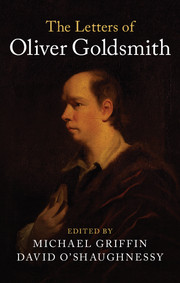27 - To Thomas Percy, [London, October 1768]
Summary
Thomas Percy (1729–1811), a Church of Ireland minister and later bishop of Dromore. Percy was also a writer, best known for his anthology The Reliques of Ancient English Poetry (1765), which he had dedicated to Elizabeth Seymour, Duchess of Northumberland, a decision which served his wife, Anne, and himself well. He was friendly with many in London cultural circles including Burke, Johnson and David Garrick; he became a member of the Literary Club in 1768. He had a close friendship with Goldsmith who asked him to write his biography. Their first meeting on 21 February 1759 at Dr Grainger's house is recorded in Percy's journal, an important source for evidence of their friendship, and indeed Goldsmith’s sociability more broadly. His memoir of Goldsmith was published in 1801.
The extent of their friendship can be seen in this frank series of questions that Goldsmith posed in response to an invitation to Percy's rectory at Easton Maudit in Northamptonshire. Clearly, he appreciated the offer but is anxious to avoid being disturbed as he was trying to write up his Roman History, which would be published by Thomas Davies in May 1769. In the end, Goldsmith did not take up the invitation. The date of the letter is conjectural but, as Balderston observes, it is highly likely that this letter followed closely on the previous one to Anne Percy: the letters appear identical. They are written on the same size paper with the same watermark (‘VI’), folded and sealed the same way and have the address written in the corner in a manner not done elsewhere in his correspondence with the exception of Letter 28 (to Boswell, 1769). The letter indicates that both Thomas and Anne Percy were away from Northamptonshire, which also indicates that this was the period when she was working as a wet-nurse.
The copy-text is the manuscript in the British Library. It was first published by Gaussen in Percy, Prelate and Poet in 1908. The letter is addressed ‘To | The Revd. Mr. Percy | Northumberland-house’.
Dear Percy
I have been thinking of your Northampton-shire offer. I beg you’l
send me an answer to the
following Queries.
1 In the first place are there any prying troublesome neighbours?
2 Can I have a chamber to myself where I can buy coals &c?
3 Will I not cumber the house and take up the room of others?
- Type
- Chapter
- Information
- The Letters of Oliver Goldsmith , pp. 77 - 78Publisher: Cambridge University PressPrint publication year: 2018



